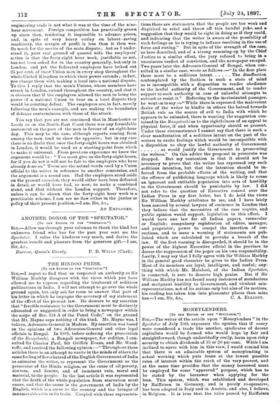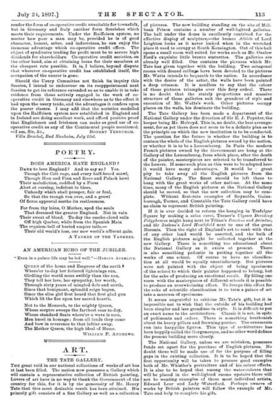MONEYLENDERS.
[TO THE EDITOR OF THE " SPECTATOR:]
SIR,—The writer of the article upon "Moneylenders " in the Spectator of July 10th expresses the opinion that if usury were considered a trade like another, syndicates of decent capitalists would be formed who would hope by fair and straightforward, though undoubtedly costly, loans upon risky security to obtain dividends of 15 or 20 per cent. While Jam inclined to agree with him in this view, I would remind him that there is an admirable system of moneylending ia actual working which puts loans at the lowest possible rates of interest within the reach of the very poorest, and at the same time provides that the money borrowed must be employed for some " approved " purpose, which has to be stated by the borrower when applying for the loan. This system, which was established and developed by Raiffeisen in Germany, and is purely co-operative, has been adopted in Italy and in Austria, and also, I believe, in Belgium. It is true that the rules passed by Raiffeisen
render the form of co-operative credit unsuitable for townsfolk, but in Germany and Italy another form flourishes which meets their requirements. Under the Raiffeisen system, no matter how poor a man may be, provided he is of good character, honest, sober, and industrious, he can enjoy the immense advantage which co-operative credit offers. The object of syndicates trading for profit must be to secure high dividends for shareholders. Co-operative credit societies, on the other hand, aim at obtaining loans for their members at the cheapest rate possible. It is, I believe, beyond dispute that wherever co-operative credit has established itself, the occupation of the usurer is gone.
Should the Usury Committee not finish its inquiry this Session, I intend to endeavour on its reapppointment next Session to get its reference extended so as to enable it to take evidence from those actively engaged in the work of co- operative credit in Germany and elsewhere as to the effect it had upon the usury trade, and the advantages it confers upon the poorer classes. I may add that the societies modelled upon the Raiffeieen system now established in England and in Ireland are doing excellent work, and afford positive proof that Englishmen and Irishmen can make as good use of co- operative credit as any of the Continental people mentioned.



































 Previous page
Previous page